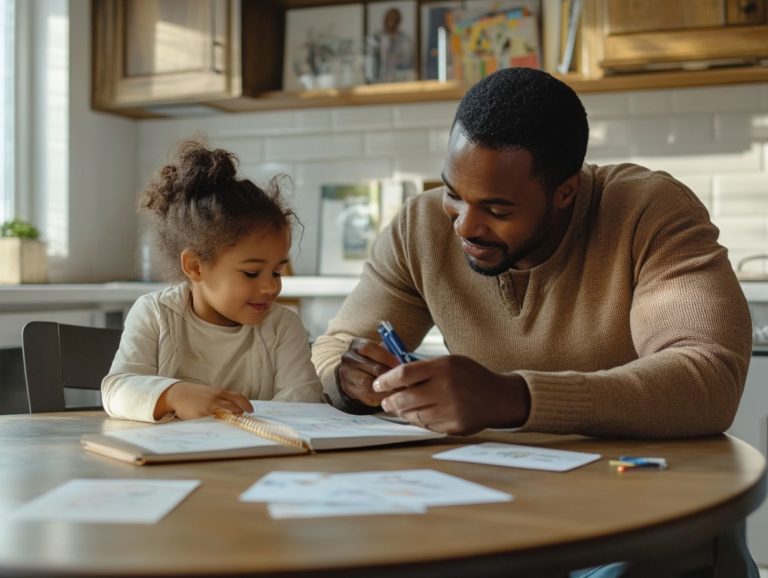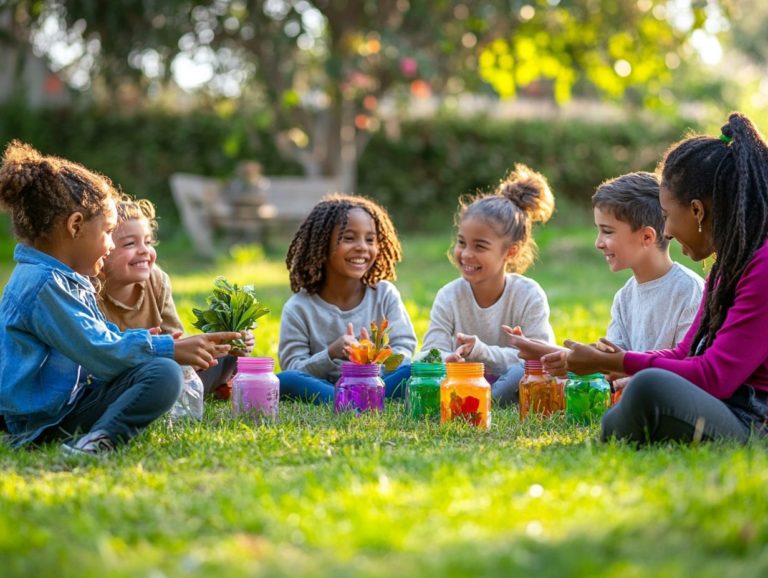How Can Families Practice Mindfulness Together?
Contents
- Mindfulness for Families: Reconnect and Thrive Together
- Key Takeaways:
- What is Mindfulness and Mindful Parenting?
- Why is Mindfulness Important for Families and Parents?
- How Can Families Practice Mindfulness Together, Including Family Activities and Mindfulness Techniques?
- 1. Start with Simple Breathing Exercises
- 2. Practice Gratitude and Appreciation
- 3. Engage in Mindful Activities and Family Activities
- What are the Benefits of Practicing Mindfulness as a Family?
- 1. Improved Communication and Relationships
- 2. Reduced Stress and Anxiety
- 3. Increased Focus and Attention
- How Can Families Overcome Challenges in Practicing Mindfulness Together?
- Frequently Asked Questions
- How Can Families Practice Mindfulness Together?
- Why is practicing mindfulness beneficial for families?
- How can families with young children practice mindfulness?
- What are some other ways families can incorporate mindfulness into their daily lives?
- Can families with busy schedules still practice mindfulness together?
- What are the benefits of making mindfulness a family practice?
Mindfulness for Families: Reconnect and Thrive Together
In today s fast-paced world, you may find your family caught in a whirlwind of daily responsibilities and the relentless barrage of technology. This can lead to sensory overload.
Mindfulness serves as a refreshing antidote, offering a pathway to reconnect and nurture deeper relationships among family members. It also enhances emotional regulation and self-control.
This article delves into what mindfulness truly means, its significance for families, and practical steps you can take to weave mindful practices into your daily life. These practices include body scan techniques and sound exploration.
From simple breathing exercises to crafting a mindful home environment, you ll discover how these techniques can elevate communication, reduce stress, and cultivate emotional resilience and self-regulation within your family.
- Mindfulness can be defined as being present and aware of one’s thoughts, feelings, and surroundings without judgment.
- Practicing mindfulness as a family can improve communication, reduce stress, and increase focus and emotional regulation.
- To overcome challenges in practicing mindfulness together, families should be patient, make it a priority, and seek outside resources and support when needed. This includes insights from experts like Dr. Mark Bertin and Elisha Goldstein.
Key Takeaways:

What is Mindfulness and Mindful Parenting?
Mindfulness is a valuable mental practice that invites you, along with your children, to immerse yourselves in the present moment. It fosters emotional awareness and self-compassion.
By engaging in techniques such as meditation and breathing exercises, you can enhance your attention, regulate your emotions, and boost your overall well-being. This improvement extends to skills needed for planning, focus, and task completion in children.
This practice is well-recognized for its ability to cultivate resilience and empathy, ultimately nurturing healthy relationships within families.
Why is Mindfulness Important for Families and Parents?
Mindfulness is essential for families, as it fosters emotional regulation and effective stress management. It equips both parents and children with vital coping strategies.
When you engage in mindfulness practices together, you enhance your emotional intelligence and nurture healthy relationships. This creates a supportive environment that promotes well-being and resilience for everyone involved.
This collective journey inspires kindness, empathy, and better communication, ultimately strengthening the family bond. Practicing mindfulness techniques together helps to develop coping strategies and enhances emotional awareness.
How Can Families Practice Mindfulness Together, Including Family Activities and Mindfulness Techniques?
You can cultivate mindfulness within your family through a range of engaging activities that encourage emotional expression and strengthen healthy relationships. Consider incorporating simple mindfulness practices into your family routines, such as:
- Nature walks
- Guided meditations
- Creative exercises
- And other mindfulness activities.
These activities foster a sense of presence and deepen the connection between parents and children. By prioritizing these mindful moments, your family can build resilience and enhance overall well-being. This equips you to navigate life’s challenges together with grace and unity.
Start your mindfulness journey today and experience the transformative power it can bring to your family!
1. Start with Simple Breathing Exercises
Starting with simple breathing exercises is a powerful way to introduce mindfulness to your children. These techniques promote stress reduction and enhance their focus. Techniques like mindful breathing help your kids develop self-control skills and provide you with effective tools to teach emotional awareness, social skills, and listening skills.
These exercises can be practiced in a quiet space. This allows your family to connect and cultivate a shared sense of calm.
Incorporating these practices into your daily routines strengthens family bonds and nurtures a supportive environment where your children can thrive emotionally. Try exciting techniques like deep belly breathing, counting breaths, or even visualizing peaceful scenes to significantly lower anxiety levels and enhance concentration.
Consider setting aside a specific area in your home dedicated to mindfulness, adorned with calming elements like soft cushions or gentle lighting. Regular practice of these breathing techniques will help instill a strong foundation for emotional resilience. This foundation ensures that you and your family are better equipped to navigate life s challenges together.
2. Practice Gratitude and Appreciation
Practicing gratitude and appreciation within your family strengthens relationships and cultivates a positive atmosphere. It is an essential mindfulness activity. By regularly sharing positive moments and expressing gratitude, you help your children develop their words to express feelings and gain a deeper understanding of kindness and empathy.
One effective way to cultivate this environment is through gratitude journals. Each family member can regularly jot down what they are thankful for. This simple act promotes a mindful approach to daily life, encouraging reflection on positive experiences. Engaging in mindfulness activities like this can greatly enhance awareness development.
Consider dedicating time during meals or evening routines to discuss the highlights of your day. This allows everyone to express their feelings openly. Such discussions reinforce gratitude and encourage emotional expression and understanding, leading to deeper connections and greater emotional resilience.
These practices also contribute to a nurturing atmosphere that celebrates positivity and attentiveness. This transformation enhances your family dynamic, fostering appreciation and connection. Experts like Scott Rogers recommend these mindful practices, which encourage a balanced approach to technology use and screen time, thereby fostering mindfulness and well-being.
3. Engage in Mindful Activities and Family Activities

Engaging in mindful activities as a family can elevate emotional regulation and awareness for both you and your children. Picture yourself on a nature walk, fully immersing in the beauty of your surroundings, or indulging in creative exercises that spark playful interactions, fostering self-expression and connection.
These shared experiences cultivate mindfulness and strengthen the bonds that tie your family together. Mindful parenting enhances your family’s overall well-being and awareness of the environment.
Incorporating activities like cooking together or practicing yoga can be incredibly beneficial. These endeavors promote teamwork and enhance communication within your family unit. Imagine a simple cooking session where your children learn about nutrition while expressing their preferences, or yoga sessions that improve concentration and relaxation skills for everyone involved.
Mindfulness games, like focused breathing or gratitude sharing, offer perfect opportunities for open dialogue about emotions. This practice deepens understanding and empathy among family members. By connecting through these mindful experiences, your family creates lasting memories while nurturing a supportive environment that fosters emotional growth.
Start implementing these mindfulness practices today for a more mindful family life!
4. Create a Mindful Environment at Home
Creating a mindful environment in your home is essential for fostering emotional safety and encouraging mindfulness practices among your family members. Designate a quiet zone for relaxation and mindfulness activities to nurture healthy relationships and enhance overall well-being.
Incorporating elements of nature and sensory exploration within your home enriches awareness of your surroundings and helps mitigate sensory overload. You can elevate this mindful atmosphere further by integrating calming colors and soft textures throughout your spaces, allowing everyone to feel at ease.
Engaging in regular routines that include shared mindfulness exercises, such as meditation or deep breathing, strengthens emotional bonds and promotes a deeper understanding of each other’s needs. Incorporating mindful activities like journaling or art provides an outlet for self-expression and reflection.
These practices enrich the sensory experience and cultivate awareness of personal feelings. Together, they create a nurturing sanctuary where emotional safety and mindfulness can truly thrive.
5. Encourage Open Communication and Active Listening
Encouraging open communication and active listening within your family is essential for fostering mindfulness and enhancing your children’s social skills. Create a safe space where everyone can express their feelings without fear of judgment.
Model effective communication strategies that prompt your children to practice empathy and compassion in their interactions. This mindful approach nurtures healthier family dynamics and strengthens emotional connections.
To deepen this practice, set aside dedicated time for regular family discussions. Engage in active listening, allowing one person to speak while the others listen intently; this can significantly improve understanding and minimize misunderstandings.
Utilizing tools like emotion charts or storytelling enables your children to articulate their feelings more effectively, promoting their emotional intelligence. These exercises enhance your kids’ social skills and reinforce the importance of authentic connections within the family.
6. Be Mindful of Screen Time, Technology Use, and Mindful Parenting
Being mindful of your screen time and technology use is essential for maintaining emotional regulation and promoting stress management within your family. Establish healthy boundaries around device usage and foster mindful interactions.
This helps your children develop self-control and awareness of their emotional responses to technology, supporting a balanced lifestyle and enhancing your family’s overall well-being.
Excessive screen time can lead to increased anxiety, irritability, and difficulty managing emotions. It s crucial for your family to tackle these challenges together.
Setting specific time limits for device use, encouraging tech-free family activities, and modeling healthy technology habits can make a significant difference in emotional health.
Teach your children techniques like deep breathing or mindfulness exercises to help them regain focus and calmness when they feel overwhelmed by screens. Prioritize face-to-face interactions and be fully present during these moments to strengthen your family’s emotional bonds.
What are the Benefits of Practicing Mindfulness as a Family?
Embracing mindfulness as a family brings a wealth of benefits, such as improved communication, better emotional regulation, and the cultivation of resilience.
By weaving mindfulness into the fabric of daily life, you enhance emotional intelligence, fortify relationships, and nurture a profound sense of well-being among all family members.
These advantages create a supportive environment where everyone has the opportunity to thrive together, skillfully navigating challenges as they arise.
1. Improved Communication and Relationships
One of the primary advantages of embracing mindfulness within your family is the significant enhancement in communication and relationships among all members. Mindfulness helps you understand each other better and encourages emotional expression, allowing you and your loved ones to connect on a deeper level.
By engaging in mindful activities together, you cultivate a supportive environment that fosters understanding and fortifies your bonds. For instance, holding regular family meetings where everyone shares their thoughts and feelings without interruption creates an atmosphere of respect and openness.
This practice enhances listening skills and promotes the validation of each person’s emotions. Simple activities, such as mindful breathing exercises or nature walks, encourage shared experiences that enable family members to express themselves freely.
These practices lead to improved conflict resolution and a greater sense of belonging, ultimately laying a solid foundation of trust that strengthens familial ties.
2. Reduced Stress and Anxiety

One of the most significant benefits of practicing family mindfulness is the remarkable reduction of stress and anxiety among all members. By engaging in mindfulness techniques like meditation and breathing exercises, you equip your family with effective coping strategies that foster emotional regulation and create a sense of calm amidst life s inevitable challenges.
This collective approach not only cultivates resilience but also enhances overall well-being. Integrating simple practices such as guided imagery or mindful walks into your family routines can help you develop a deeper awareness of your thoughts and emotions.
- Sharing gratitude journals
- Participating in group yoga
These activities can further strengthen your family bonds and establish a supportive environment. These techniques assist in managing immediate stressors and enable each family member to navigate life s ups and downs with a clearer perspective.
As a result, you nurture emotional stability within your family.
3. Increased Focus and Attention
Practicing mindfulness as a family can greatly enhance focus and attention, providing a significant boost to your children’s academic performance and overall emotional regulation. Mindfulness techniques sharpen concentration and enhance your ability to remain present, enabling your family to tackle daily tasks with greater effectiveness.
Incorporating mindfulness activities such as deep breathing exercises, guided imagery, or simple yoga routines can markedly improve your children’s ability to concentrate on their studies. For instance, introducing a five-minute breathing exercise before homework can ready their minds, minimizing distractions and cultivating a calm state for effective learning.
Mindful walks in nature can also elevate attention spans and spark creativity both essential ingredients for academic success. By consistently engaging in these practices, your children not only enhance their focus but also develop invaluable life skills that support their emotional well-being and academic achievements.
4. Enhanced Emotional Regulation
Engaging in family mindfulness practices can significantly enhance your emotional regulation, enabling you to better understand and manage your emotions. By incorporating mindfulness techniques like guided meditations and emotional awareness exercises, your family can develop effective coping strategies, fostering resilience in the face of life s challenges. This enabled emotional landscape not only supports healthy relationships but also contributes to overall well-being.
For example, you can practice deep-breathing exercises together, providing a moment for each family member to pause and connect with their feelings during stressful times. Another invaluable technique is using a “feelings wheel”, which encourages everyone to articulate their emotions instead of reacting impulsively. By setting aside a specific time each week for mindfulness activities, your family can establish a routine that nurtures emotional growth and fosters open communication.
These practices equip family members with essential tools for navigating strong emotions while cultivating an atmosphere of empathy, ensuring that everyone feels heard and valued.
How Can Families Overcome Challenges in Practicing Mindfulness Together?
Families frequently encounter challenges when attempting to practice mindfulness together, yet overcoming these hurdles demands patience, understanding, and unwavering support from every member.
By acknowledging that mindfulness is a skill that requires time and dedication to cultivate, you can create a nurturing environment that invites your children to participate in mindfulness practices. This shared commitment not only fosters resilience but also fortifies the bonds that unite your family.
1. Be Patient and Understanding
Exhibiting patience and understanding is crucial for families practicing mindfulness together, as it allows each member to progress at their own pace. When you recognize that emotional regulation and mindfulness skills take time to develop, you create a supportive environment where both parents and children feel encouraged to explore mindfulness practices without the fear of judgment.
Patience enables you and your family to approach mindfulness techniques with curiosity rather than pressure, cultivating a positive atmosphere. Consider setting aside a specific time each day for mindfulness practice, making it clear that it s a shared commitment among everyone.
During these sessions, you can model patience by guiding your children through breathing exercises, allowing pauses for reflection, and fostering open discussions about feelings. By acknowledging each other’s progress whether it s a child managing frustration more effectively or a parent noticing a reduction in stress levels you nurture emotional regulation and reinforce your collective journey toward mindfulness.
2. Make it a Priority
Making mindfulness a priority in your family routines is essential for nurturing emotional regulation and fostering effective communication among all members. By scheduling regular mindfulness activities and discussions, you can effortlessly weave these practices into your daily life, reinforcing their significance and cultivating a shared commitment to well-being.
This shared experience not only strengthens the bonds within your family but also creates a safe space for everyone to express their feelings and thoughts openly. For instance, you might dedicate a few minutes each evening to engage in deep breathing exercises or guided meditation, allowing everyone to unwind and reflect on their day.
During meals, taking a moment to practice gratitude can significantly enhance emotional awareness and appreciation for one another. Incorporating mindfulness walks into your routine, where you observe nature and share your thoughts, encourages healthy communication while promoting emotional regulation.
These practical examples work to instill a sense of calm and understanding within your household, transforming your family dynamics for the better.
3. Seek Outside Resources and Support

Seeking outside resources and support can greatly improve your family’s mindfulness journey. By exploring books, workshops, and online courses centered around mindfulness, you can equip yourself with essential tools that enhance communication, self-compassion, and emotional awareness, ultimately enriching your family experience.
Joining local or virtual mindfulness groups is a great way to create a supportive community and foster accountability. This encourages your family to remain committed to your practice. Consider recommended readings such as “The Whole-Brain Child” by Daniel J. Siegel, which offers profound strategies for nurturing emotional well-being and stress management. Professional workshops can also provide personalized guidance tailored to your family’s unique dynamics.
Online platforms like Headspace and Calm feature specialized courses crafted for family mindfulness. They include guided meditations and breathing exercises, making it easier than ever to incorporate mindfulness into your daily routines. Embracing these resources not only supports your ongoing learning but also cultivates an environment where mindfulness becomes a shared and enriching experience for everyone involved.
Frequently Asked Questions
How Can Families Practice Mindfulness Together?
Families can practice mindfulness together by incorporating mindful activities into their daily routine, such as:
- Mindful breathing exercises
- Nature walks
- Guided meditation
These activities help in developing focus and emotional regulation.
Why is practicing mindfulness beneficial for families?
Practicing mindfulness together as a family can improve communication, reduce stress, and strengthen relationships. It also enhances emotional awareness, focus, and resilience.
How can families with young children practice mindfulness?
Families with young children can practice mindfulness through fun and engaging activities, such as:
- Mindful coloring
- Playful interactions
- Mindful listening games
These activities promote empathy and attention.
What are some other ways families can incorporate mindfulness into their daily lives?
Aside from specific activities, families can practice mindfulness by being present and fully engaged in everyday tasks, such as cooking, eating, or playing together. You can also create a quiet zone for relaxation and sound exploration, which can be beneficial.
Can families with busy schedules still practice mindfulness together?
Yes! Even with busy schedules, families can set aside a few minutes each day for a quick mindfulness practice, such as:
- A mindful walk
- A gratitude exercise
These small practices can help in stress reduction and improving self-regulation.
What are the benefits of making mindfulness a family practice?
Practicing mindfulness as a family fosters a sense of togetherness, improves emotional regulation, and promotes overall well-being for everyone involved. It also contributes to better social skills, academic performance, and stress management.
Join your family in starting this rewarding mindfulness journey today!






